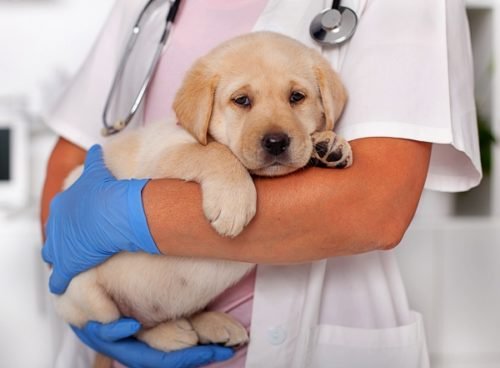A dog’s digestive system can be seriously affected by surgery. Whether they’re recovering from dental surgery or a more invasive operation, it’s normal for a dog to temporarily lose their appetite, or even develop an aversion to food in general.
This can cause serious problems if you don’t take appropriate action soon enough, so it’s important to know what to do if your dog won’t eat after surgery.
Below are some tips on how to help your pet recover as quickly as possible so that he or she can get back on the road to being fully healthy and happy!
Is This Normal?

After a surgery, it is normal for your dog to refuse food for a few days. This is because their stomach has been altered by the anesthesia and any wounds from the surgery. A
s time goes on, they will begin to eat again. If your dog refuses food after two days post-op, then consult with your veterinarian. They may have an infection or other medical complication that requires immediate attention.
Most surgeries are performed under general anesthesia, which affects how the stomach processes food. The gastrointestinal tract also needs some time to recover from this type of procedure. However, if you notice bleeding in vomit or stool, unusual lethargy, weakness, rapid breathing or elevated heart rate contact your vet immediately.
When To Worry
If your pet is not eating 24 hours after surgery, then you should be concerned. This could be a sign that something went wrong during the procedure and it may need to be checked by a vet.
If your pet still won’t eat two days after surgery, then this may indicate a more serious health issue. Contact your veterinarian ASAP if this happens to ensure they can get the proper care and treatment they need as soon as possible.
You also want to make sure that your dog’s mouth doesn’t become too dry or irritated because of lack of saliva. You can either soak their kibble in water so they don’t have trouble chewing or give them boiled chicken on soft bread every few hours while they recover from surgery.
Why This Happens

When a dog has surgery, it is possible that they will lose their appetite. In some cases, this can be due to the anesthesia or other medications administered during the procedure. A lack of appetite may also be related to pain from the surgery site and discomfort from sutures. The exact cause of your dog’s lack of appetite after surgery will not always be clear. It may take some time for your dog to get back to eating on their own, but there are steps you can take in the meantime.
Offer them food as soon as they wake up. Be patient and offer food at least once per hour, or more often if your pet doesn’t seem interested. Offer tasty foods (e.g., cooked meat) that have been refrigerated beforehand so that they don’t spoil before being eaten.
Use different types of food with different textures (e.g., moist versus dry) to keep things interesting and provide variety for picky eaters.
Tips For Getting Your Dog To Eat
If your dog won’t eat after surgery, you can try the following:
1) Offer the food at different times of the day.
2) Mix a little water or broth into the food (may help to keep it moist).
3) Add warm water to a wet dog food mixture or use canned wet food.
4) Feed small amounts at a time and stop as soon as they start eating again.
5) Use boiled chicken breast with rice in order to make it more appealing.
6) Get your pet started with liquid diets such as Pedialyte, soy milk or another liquid with nutrients added in.
7) It may take days for your dog’s appetite to return so be patient and avoid forcing them if possible!
8) Make sure that there are no other problems that could be causing lack of appetite such as a toothache or allergies.
Consulting Your Vet

If your dog won’t eat after surgery, consult with your veterinarian for advice. The vet will be able to assess your dog’s condition and make recommendations accordingly.
In some cases, the vet may suggest a feeding tube to provide sustenance if the animal is not able to take in food by mouth. In other cases, they may prescribe appetite stimulants such as metoclopramide or domperidone to encourage the dog to start eating again.
Dogs who are unable to eat due to pain or discomfort can be given appropriate pain relievers (such as Rimadyl) and stomach protectants (such as Tagamet). They might also require intravenous fluids if they become dehydrated from refusing to drink.
Remember that you should always consult with your vet before administering any medications to your pet without their knowledge so that the medication dosage can be adjusted appropriately.
Conclusion
If your dog is not eating after surgery, there are a few things you can do to get him back on track. Some dogs will stop eating for a day or two after they’ve had surgery, while others may take weeks to start eating again.
In the meantime, it’s important to make sure your dog is drinking enough fluids and getting his electrolytes replenished with sports drinks like Gatorade.
You should also call your vet if he shows any signs of weakness, lethargy, fever or other symptoms that could indicate an infection or other problem.
If you’re still concerned about your pup’s appetite even after all these steps, talk to a vet before starting an aggressive treatment plan.

